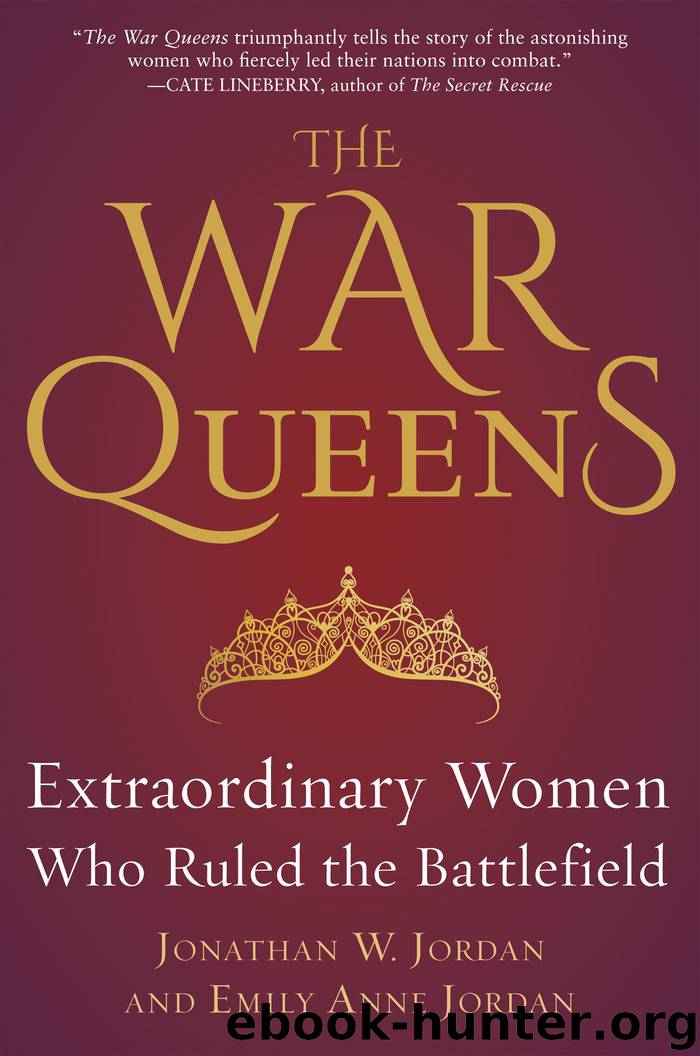The War Queens: Extraordinary Women Who Ruled the Battlefield by Jonathan W. Jordan & Emily Anne Jordan

Author:Jonathan W. Jordan & Emily Anne Jordan [Jordan, Jonathan W. & Jordan, Emily Anne]
Language: eng
Format: epub
Amazon: B07YGWSH2P
Publisher: Diversion Books
Published: 2020-03-10T00:00:00+00:00
KAMBU’S RELEASE set the two kingdoms on a path to peace. The following year Portugal signed a formal treaty with Matamba. The Lucala River would form the boundary between Angola and Matamba. Njinga agreed to end some of the more odious Imbangala practices, like infanticide and cannibalism, and white priests would be permitted to practice Catholicism in her lands.
The bargain ended more than thirty years of war.
Njinga spent her twilight years shoring up Matamba’s political stability, building institutions that would outlive her. Peace with Portugal and the flowering of Christianity were central pillars of her nation’s long-term political health. Anointing her sister Kambu as her successor, she nudged Matamba closer to the European model of royal succession.45
But the old warrior spirit never left her. In her last years, she took pleasure recalling her adventures fighting and running, killing and leading. With a broad smile, she regaled Capuchin missionaries with tales of her days ambushing bands of Imbangala, Ndongo, and Portuguese. In her eighth decade, she astonished one priest by rising nimbly from her chair and demonstrating the war dance she had mastered in her childhood, one full of intricate twists, turns, and dodges every Mbundu warrior memorized, so an enemy’s poisoned arrows wouldn’t find a home between her ribs.
As in 1626, when she first went to war against Portugal, Njinga used mystic spirits to ratify her tilt toward Catholicism. She held a public ceremony where nganga priests became possessed by four great Imbangala spirits. These spirits, to no one’s surprise, told Njinga that if she wished to live as a Christian, she was free to do so.
With the backing of the spirit world, Njinga prayed daily before a wooden crucifix that had been recovered from one of her old battlefields. She ordered churches built, and renamed her capital Santa Maria de Matamba. She even gave up her forty male concubines, lovers, and spouses, and began corresponding with the Vatican. In June 1660 Pope Alexander VII welcomed Njinga as “Dearest in Christ our Daughter Anna Queen Nzinga.” The woman who had reinvented herself as a warrior, baptized Catholic, king, blood-drinking Imbangala, reborn Catholic, and monogamous statesman ruled a kingdom temporarily secure and at peace.
Download
This site does not store any files on its server. We only index and link to content provided by other sites. Please contact the content providers to delete copyright contents if any and email us, we'll remove relevant links or contents immediately.
The Secret History by Donna Tartt(16611)
The Social Justice Warrior Handbook by Lisa De Pasquale(11486)
Thirteen Reasons Why by Jay Asher(7783)
This Is How You Lose Her by Junot Diaz(5754)
Weapons of Math Destruction by Cathy O'Neil(5032)
Zero to One by Peter Thiel(4818)
The Myth of the Strong Leader by Archie Brown(4786)
Promise Me, Dad by Joe Biden(4441)
Stone's Rules by Roger Stone(4413)
Beartown by Fredrik Backman(4406)
How Democracies Die by Steven Levitsky & Daniel Ziblatt(4393)
The Fire Next Time by James Baldwin(4338)
100 Deadly Skills by Clint Emerson(4072)
A Higher Loyalty: Truth, Lies, and Leadership by James Comey(4027)
Rise and Kill First by Ronen Bergman(4009)
The David Icke Guide to the Global Conspiracy (and how to end it) by David Icke(3876)
The Farm by Tom Rob Smith(3870)
Secrecy World by Jake Bernstein(3774)
The Doomsday Machine by Daniel Ellsberg(3726)
